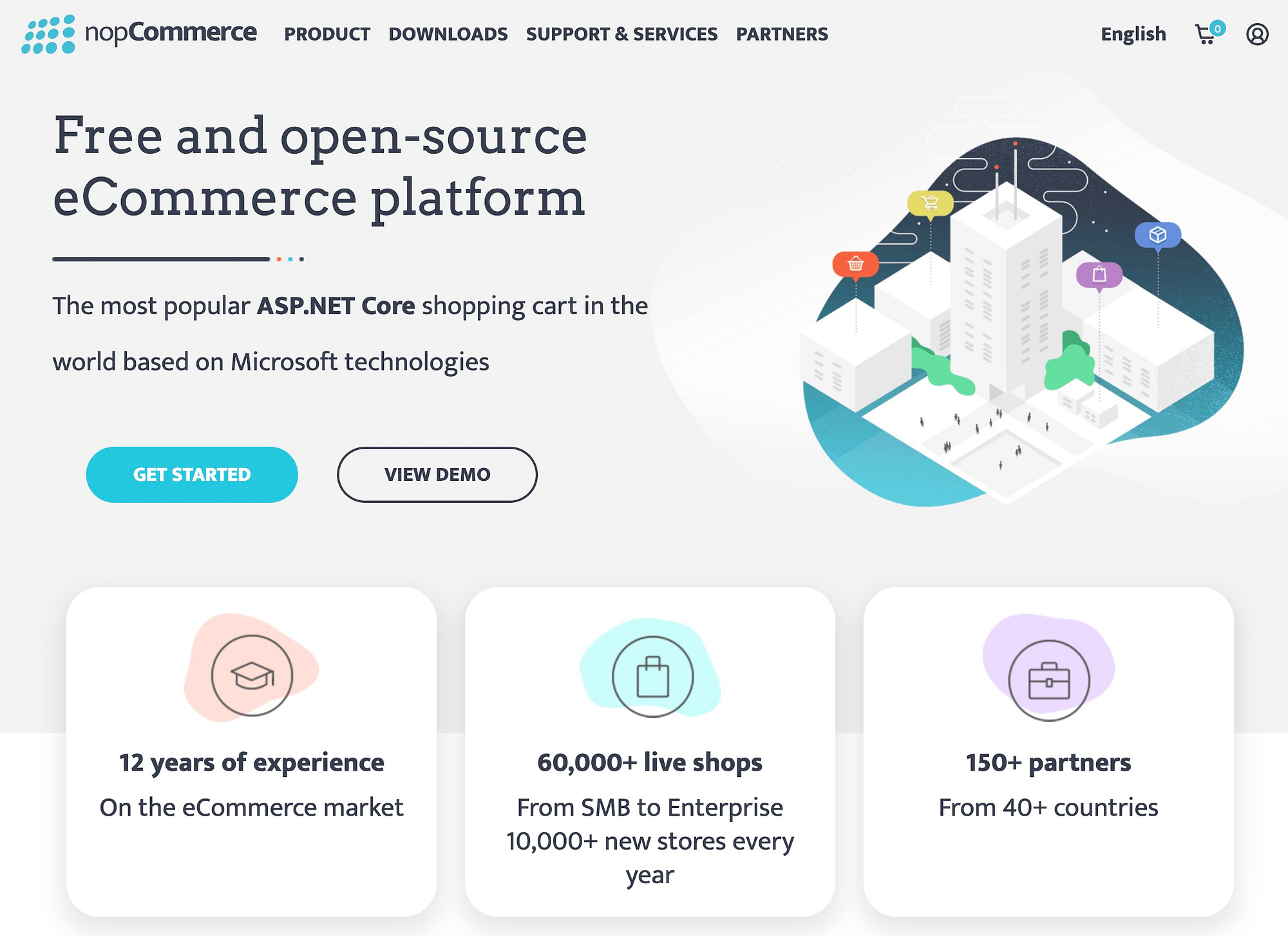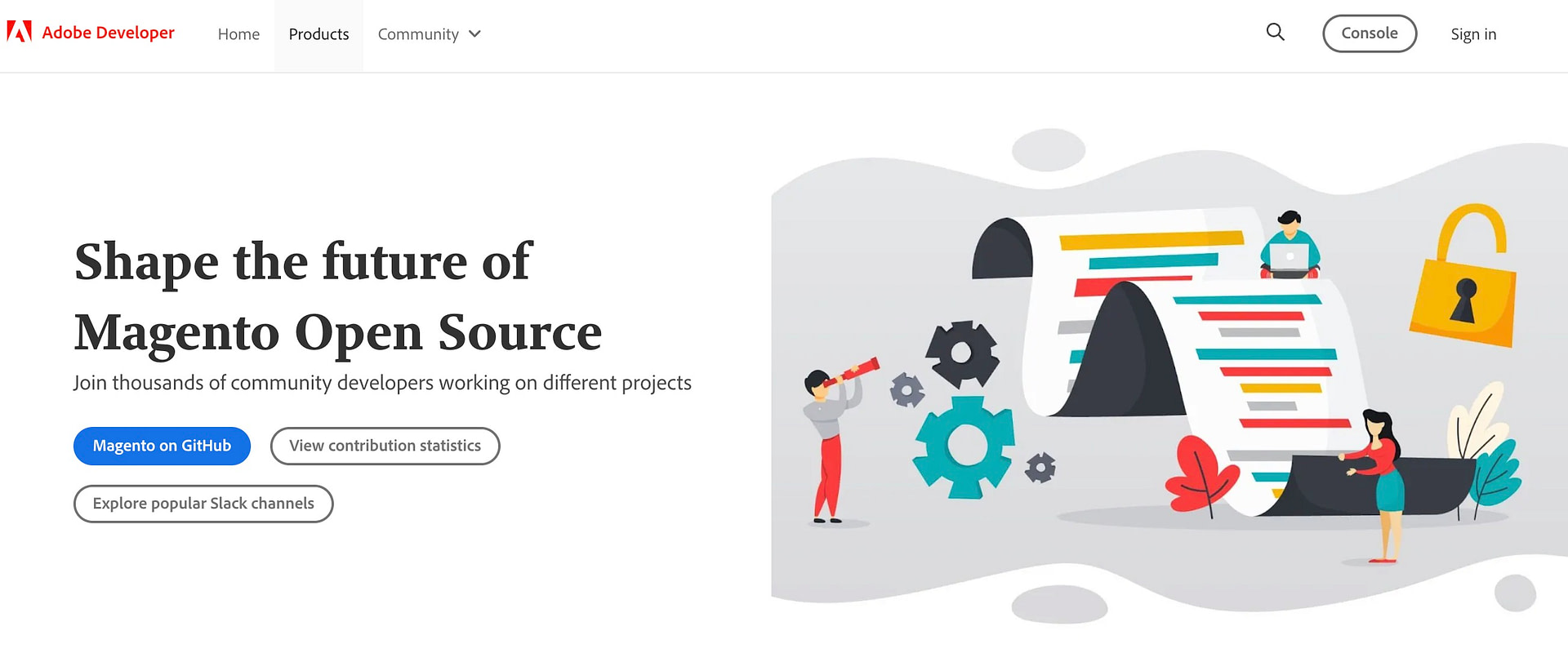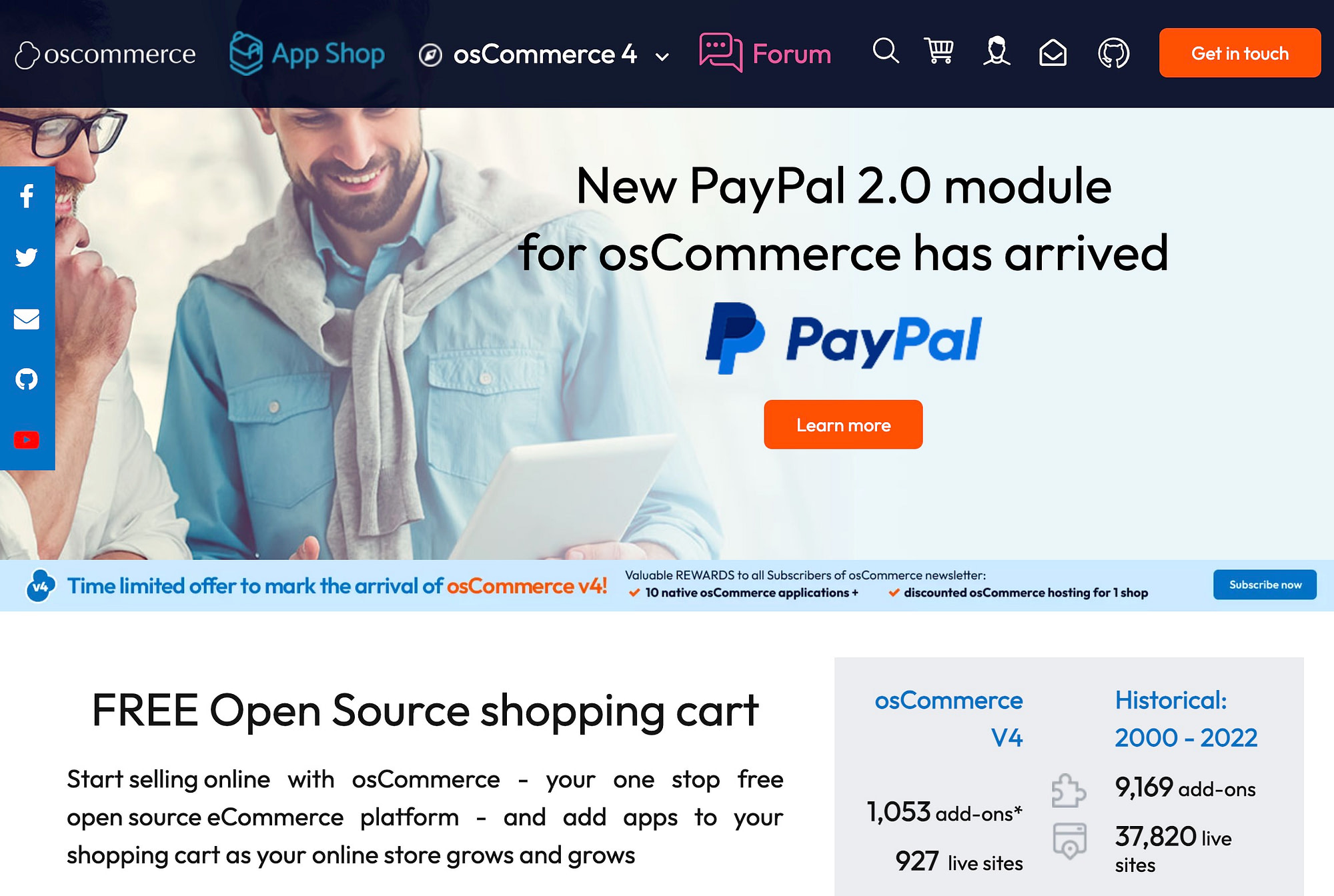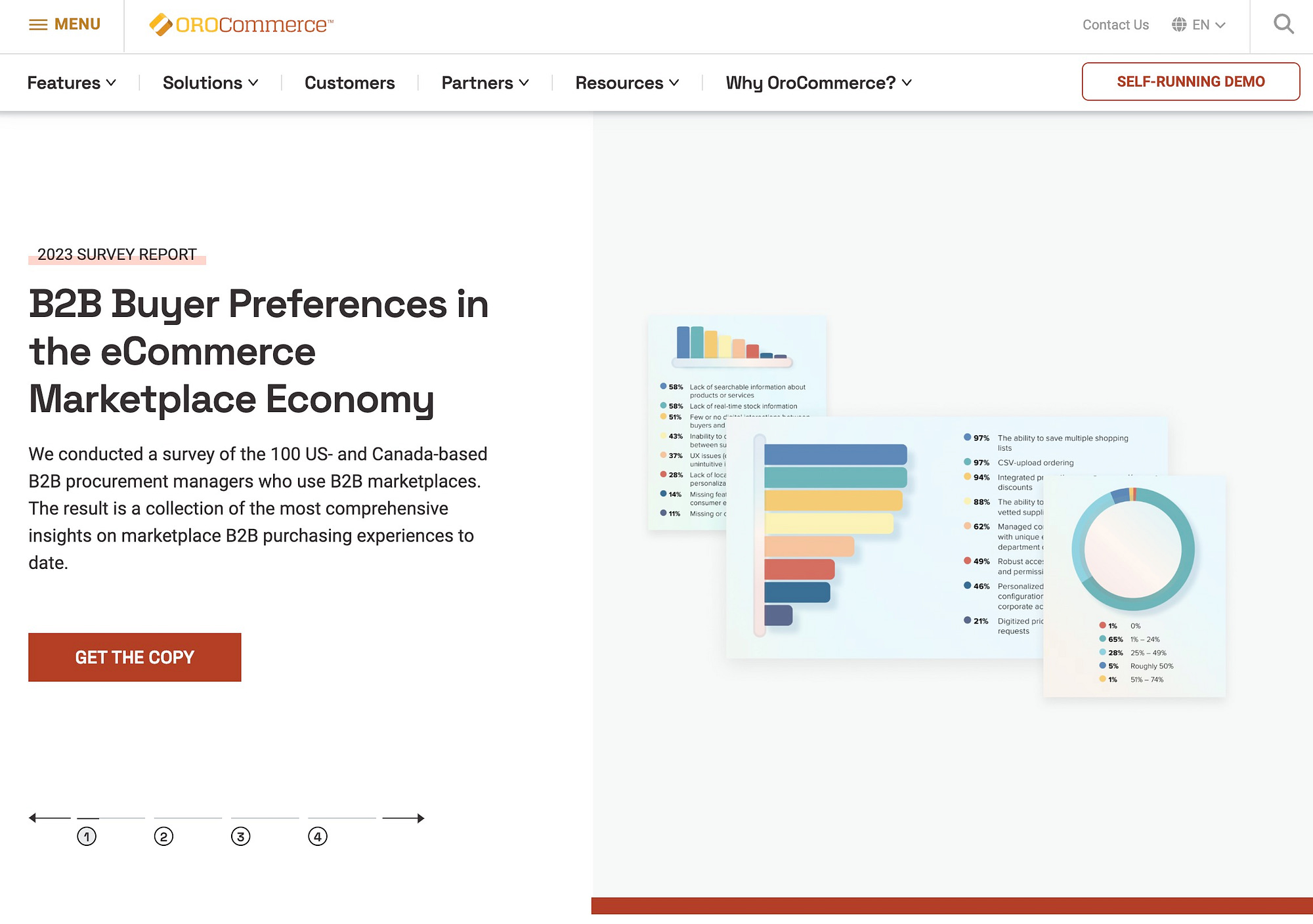[ad_1]
These days, it’s common to opt for an all-in-one SaaS (software-as-a-service) ecommerce platform. We’re talking about the likes of Shopify, Wix, and Squarespace, the platforms that provide everything from hosting to website builders for you, at a monthly subscription. But what about open source ecommerce platforms? 🛍️
These are platforms that offer unlimited flexibility, complete control over your data, and often (though not always) very inexpensive, or free, tools to build and manage your ecommerce store. As you can see, open source platforms have some extraordinary advantages over the basic SaaS ecommerce providers.
🔥 So, we’re going to cover the best open source ecommerce platforms for your business and then we’ll take a look at seven real-life examples of each platform in action. But first, let’s quickly review what we mean by open source ecommerce platform.
What makes an ecommerce platform “open source?”
An open source ecommerce platform refers to software that is developed collaboratively, allowing its source code to be freely available to the public. This means that anyone can access, change, and distribute the code, fostering a community-driven approach to development.
Benefits of an open source ecommerce platform
- Flexibility and customization options: Open source empowers businesses to customize and adapt the platform to their specific needs.
- Active community support: With contributions from numerous developers, the platform offers endless resources and extensions.
- Total ownership: You have complete control over design, content, and functionality.
- Long-term sustainability: You’re not reliant on a single vendor for ongoing support or maintenance.
- Integration capabilities: Open source software is designed to integrate with various tools seamlessly.
Differences between open source vs SaaS ecommerce platforms
Open source ecommerce platforms and SaaS ecommerce platforms both provide solutions for building and managing online stores. However, they differ in various areas. In this comparison, we’ll highlight the distinctions between open source ecommerce platforms and SaaS ecommerce platforms like Shopify, BigCommerce, and Volusion.
👉 Open source ecommerce platforms:
- Flexibility: Users can modify the source code to meet their specific needs.
- Ownership: Businesses can customize hosting, data ownership, and other aspects.
- Free or no-subscription pricing: They either have no subscription fees or are entirely free, enabling affordable online store launches.
- Community support: Open source platforms have a global community of developers and users.
👉 SaaS ecommerce platforms like Shopify, BigCommerce, and Volusion:
- Ease of use: SaaS platforms are designed to be user-friendly and intuitive, making them suitable for businesses without dedicated IT resources.
- Managed hosting: SaaS platforms handle all aspects of hosting, eliminating the need for users to manage their infrastructure.
- Subscription pricing: For SaaS platforms, subscription pricing enables users to pay for ongoing hosting services, including infrastructure, security updates, and scalability.
- Dedicated customer support: SaaS ecommerce platforms prioritize direct customer support, offering channels like email, live chat, and phone support.
If you think the open source ecommerce approach meets your needs best, we’ll spend the rest of the post covering your best options… ⭐⭐⭐
The best open source ecommerce platforms in 2023
It can be overwhelming to choose the best open source ecommerce platform for your business. In this section, we’ll compare the top options.
1. WooCommerce
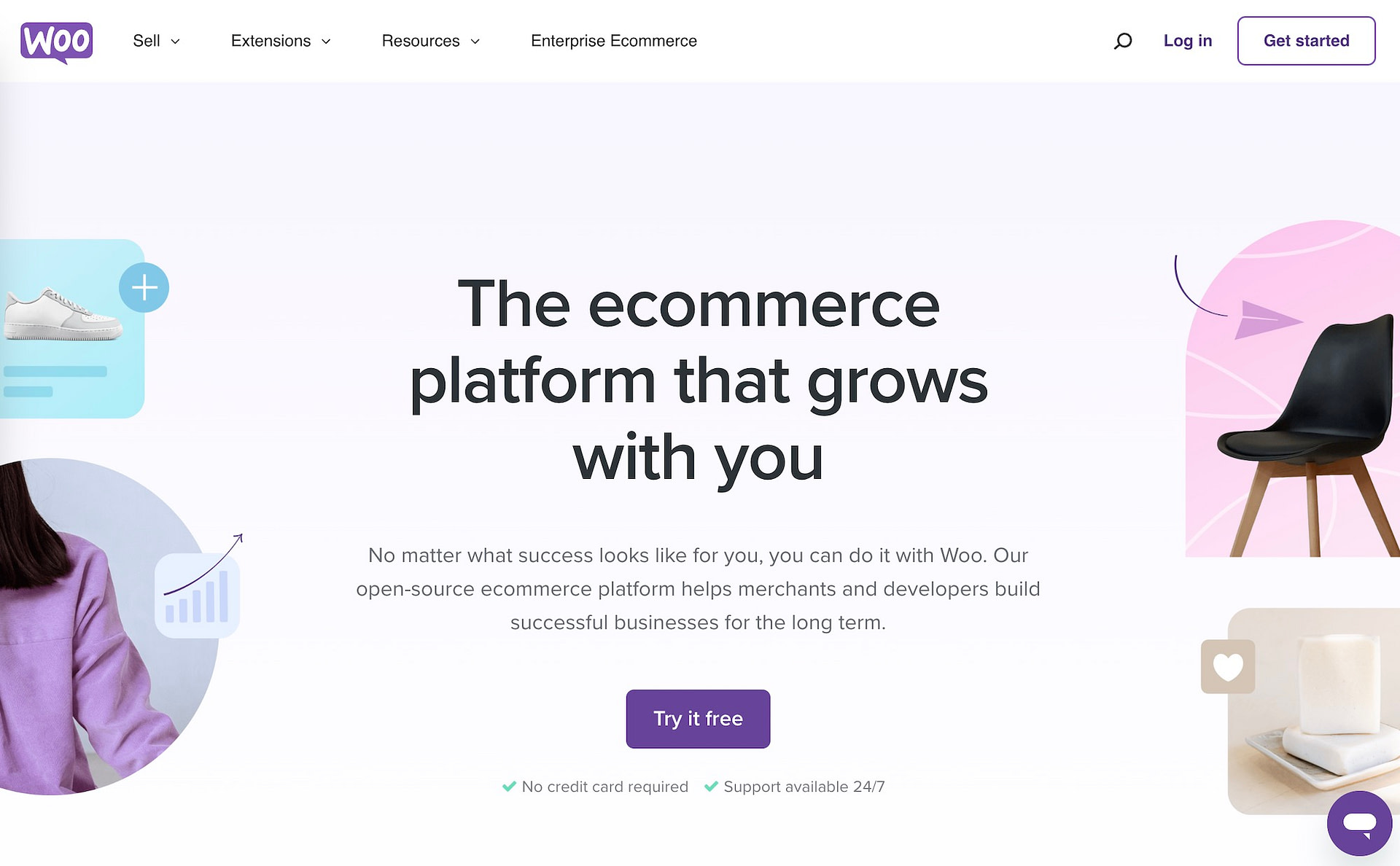
WooCommerce is an open source ecommerce platform and plugin that works with works with WordPress, making it ideal for those familiar with the WordPress experience.
One of its standout features is its flexibility, offering countless plugins, themes, and payment gateways.
It caters to businesses of all sizes, supporting physical and digital product sales.
With a massive online community, and suitability for all, WooCommerce is a top choice for building a store.
Pros 👍
- Customization: You can tweak every aspect of your store to match your brand.
- Integration with WordPress: WooCommerce integrates seamlessly with your existing WordPress site, making it easy to manage your online store along with other aspects of your website – like its blog.
- Plentiful themes: Choose from free and premium themes by a multitude of sellers online.
- Scalability: WooCommerce can handle small or large stores.
- Extensive plugin ecosystem: There are thousands of WooCommerce plugins for everything from SEO to customer reviews and ratings.
Cons 👎
- Initial complexity: While WooCommerce’s flexibility is a major advantage, it can also lead to complexity, especially for beginners.
- Reliance on WordPress (if you don’t like WordPress): The fact that WooCommerce is a WordPress plugin means it’s dependent on that platform. If you’re not using WordPress, or if you prefer using another CMS, you’re out of luck. However, if you do like WordPress for its other benefits, this can also be a “pro”.
Pricing 💵
The WooCommerce plugin is free, but you’ll have to pay for things like hosting, domain names, and themes.
2. X-Cart
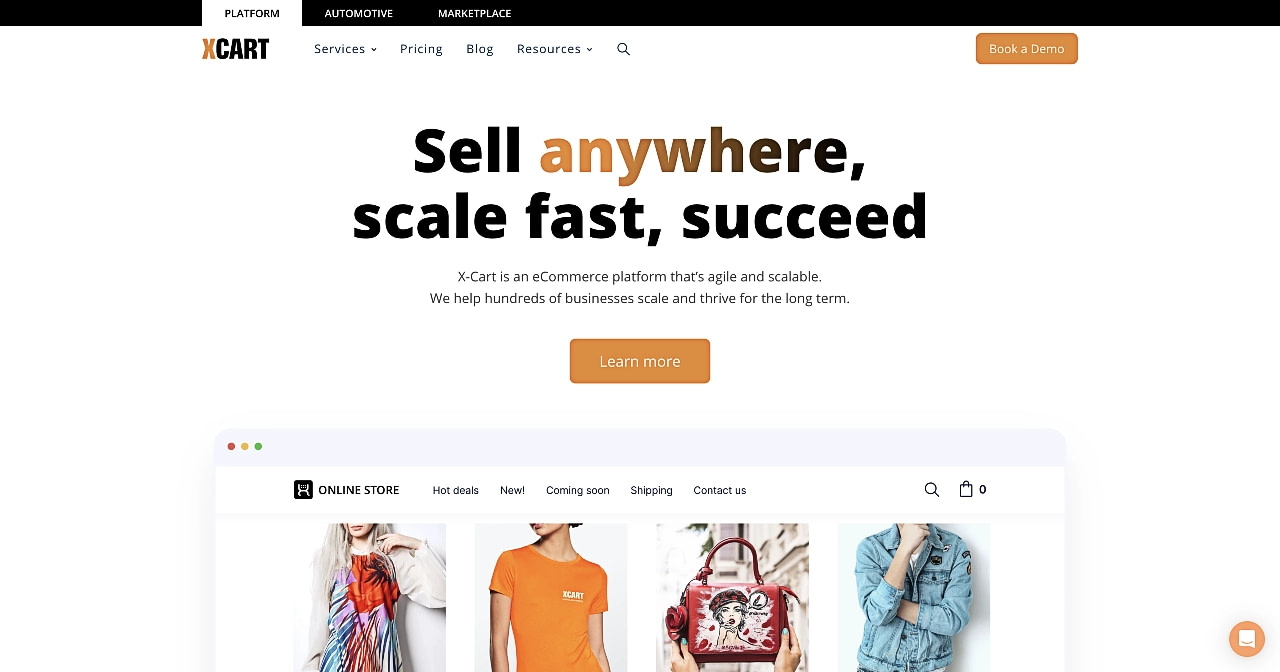
X-Cart provides a system with product management, inventory tracking, order fulfillment, and payment processing.
It also offers comprehensive customer support through documentation, tutorials, and a community forum.
Suitable for various industries, X-Cart offers a standard ecommerce platform, along with one for marketplaces, and another for automotive online stores.
Pros 👍
- Customization options: X-Cart offers extensive customization options, allowing businesses to create a unique online store that aligns with their brand.
- Scalability: With its scalable features, X-Cart can grow alongside your business.
- User-friendly interface: X-Cart is known for its straightforward and intuitive interface, simplifying the process of managing an online store.
- Global expansion: X-Cart accommodates businesses looking to expand internationally, offering features that support global operations.
Cons 👎
- Dependency on plugins: X-Cart often relies on third-party plugins for additional functionality, which can require extra maintenance.
- No built-in blog feature: Unlike some competitors, X-Cart does not offer a built-in blog feature. There are some blog add-ons, but they’re clunky and expensive.
Pricing 💵
X-Cart offers a range of pricing plans:
- Platform Plan: $199 per month.
- Marketplace Plan: $399 per month.
- Automotive Plan: $499 per month.
3. NopCommerce
NopCommerce, a platform built on ASP.NET Core, excels in built-in functionalities like inventory management, order processing, payment integration, marketing tools, and SEO optimization. Customer support options include a community forum, documentation guides, and tutorials. With a user-friendly interface, NopCommerce simplifies store setup and management, particularly catering to industries like furniture, B2B, international, fashion, and automotive.
Pros 👍
- Customizability: NopCommerce allows for extensive customization, making it ideal for businesses with unique requirements.
- User-friendly interface: The platform offers a simple and intuitive interface, which is great for all skill levels.
- Built-in functionalities: NopCommerce comes with a host of in-built features for inventory management, order processing, payment integration, and more, minimizing the need for additional plugins or software.
- Scalable: The platform is built to scale with a business’s growth.
Cons 👎
- Version updates: NopCommerce regularly releases new versions that offer improvements and additional features. However, upgrading to a new version can be a complex process and may require professional assistance.
- Hosting costs: NopCommerce is an ASP.NET based platform, and hosting costs for such platforms can be relatively high.
- Limited themes: The selection of free themes from NopCommerce is limited.
Pricing 💵
NopCommerce is free to download and use.
However, you should be aware of additional expenses like hosting fees, theme purchases, domain name acquisition, and professional assistance.
4. Magento Open Source
Although acquired by Adobe and brought into its collection of design software, Adobe has kept Magento Open Source separate from its new (Magento powered) Adobe Commerce product.
It’s a good thing, too, because Magento is perhaps the most powerful open source ecommerce platform, boasting a beautiful drag-and-drop page builder, multi-source inventory, and an unshakable security package.
The headless commerce platform offers flexible customization options for businesses looking to establish and grow their online presence. With comprehensive customer support, intuitive interfaces, and some new integrations with Adobe products (thanks to the Adobe acquisition), Magento Open Source makes the perfect platform for rapidly scaling businesses.
Pros 👍
- Comprehensive customer support: From documentation and forums to community events, Magento Open Source offers a range of expert support options and a committed community on places like Slack and Github.
- Support for B2B and B2B: Sell to businesses and consumers from one interface and tailor the checkout for each.
- Scalability: Designed to accommodate enterprise businesses, Magento Open Source provides the scalability needed to support your business growth.
- Adobe integrations: The system plays nicely with other Adobe tools like Adobe Stock and Adobe Experience Manager.
Cons 👎
- Steep learning curve: Beginners will find it complex and challenging to navigate.
- Cost: Although technically free, Magento Open Source has a hefty indirect price tag. These generally involve costs associated with customization and maintenance.
- Resource-intensive: Magento Open Source is a resource-heavy platform that may require significant server power.
Pricing 💵
Free, but it’s common to spend thousands of dollars on custom Magento development, extensions, hosting, and themes.
5. PrestaShop
PrestaShop provides full customization and control, allowing users to tailor their stores to their specific needs.
With customizable product catalogs, secure payment gateways, multiple shipping options, and marketing tools, businesses of all sizes can efficiently manage products, orders, and customers. PrestaShop also offers a large marketplace of extensions and themes.
Pros 👍
- Customizability: PrestaShop offers extensive customization options, allowing businesses to create a unique storefront.
- Large marketplace: PrestaShop features a large marketplace filled with extensions and themes for added customization.
- Diverse product catalog: PrestaShop supports both physical and digital goods (and more), catering to a wide range of business needs.
Cons 👎
- Learning curve: While PrestaShop is loaded with features, new users might find it somewhat complex.
- Dependency on add-ons: Many essential features in PrestaShop require additional extensions or modules, which could potentially add to the cost.
Pricing 💵
- PrestaShop Edition Basic: Free, but you need to get your own hosting and other paid elements.
- PrestaShop Edition: Starting at roughly $25 per month for included hosting, domain name, installation, and other modules.
6. osCommerce
OsCommerce offers an extensive library of add-ons and modules to enhance store functionality, while the user-friendly interface makes it accessible to those with basic website management skills.
We recommend it for small to medium-sized businesses seeking a customizable ecommerce solution.
Pros 👍
- Flexibility and customizability: osCommerce allows you to tailor your online store to your specific needs, making it a versatile choice for businesses of all sizes.
- Extensive library of add-ons: From payment gateways to marketing tools, osCommerce offers a wide range of functionalities that integrate easily with your store.
- Active community support: With a bustling forum, documentation, and user guides, osCommerce provides solid support to its users.
- User-friendly interface: Despite requiring a bit of technical knowledge, the platform’s user-friendly interface makes it relatively easy to manage for those with basic website management skills.
Cons 👎
- Limited design options: The platform’s design capabilities are not as advanced or intuitive as other ecommerce platforms.
- Premium (direct) customer support: You have to pay some fairly high prices for human assistance.
- Outdated interface: Some users may find the platform’s interface outdated compared to other more modern ecommerce solutions.
Pricing 💵
osCommerce is free, but it involves additional costs, like web hosting and add-ons.
7. OroCommerce
OroCommerce provides powerful features, flexibility, and functionality for B2B operations. Customer support is comprehensive, with various resources available. The user-friendly interface, responsive design, and flexible architecture make it easy to manage catalogs, products, orders, and customer data.
Pros 👍
- Customizable platform: OroCommerce is highly customizable, allowing B2B businesses to adapt the platform to their specific needs.
- Comprehensive customer support: With various resources available, users have access to detailed support when needed.
- User-friendly interface: The easy-to-navigate interface makes managing various aspects of an ecommerce site relatively simple.
- Robust B2B functionality: OroCommerce is designed specifically for B2B operations and provides tools and features specifically catered to this market.
Cons 👎
- Cost implications: While OroCommerce is open source and technically free, there may be significant costs involved in customization, integration, and ongoing support.
- Lack of B2C functionality: OroCommerce isn’t the best choice for businesses that also have a B2C component.
Pricing 💵
OroCommerce offers a free Community edition and a more feature-rich Enterprise edition. The cost of the Enterprise edition is customized. The free version will have additional costs for hosting, premium themes, and more.
Examples of successful businesses built on open source ecommerce platforms
This section will shine a spotlight on a handful of successful businesses that have harnessed the power of open source ecommerce platforms, hopefully sending inspiration your way.
WooCommerce – All Blacks Shop

The world-famous All Blacks, a rugby team from New Zealand, runs its merchandise website on the WooCommerce platform.
X-Cart – Books4School

Books4School, a notable discount store for school books, manages its entire online business on the X-Cart infrastructure.
NopCommerce – Volvo
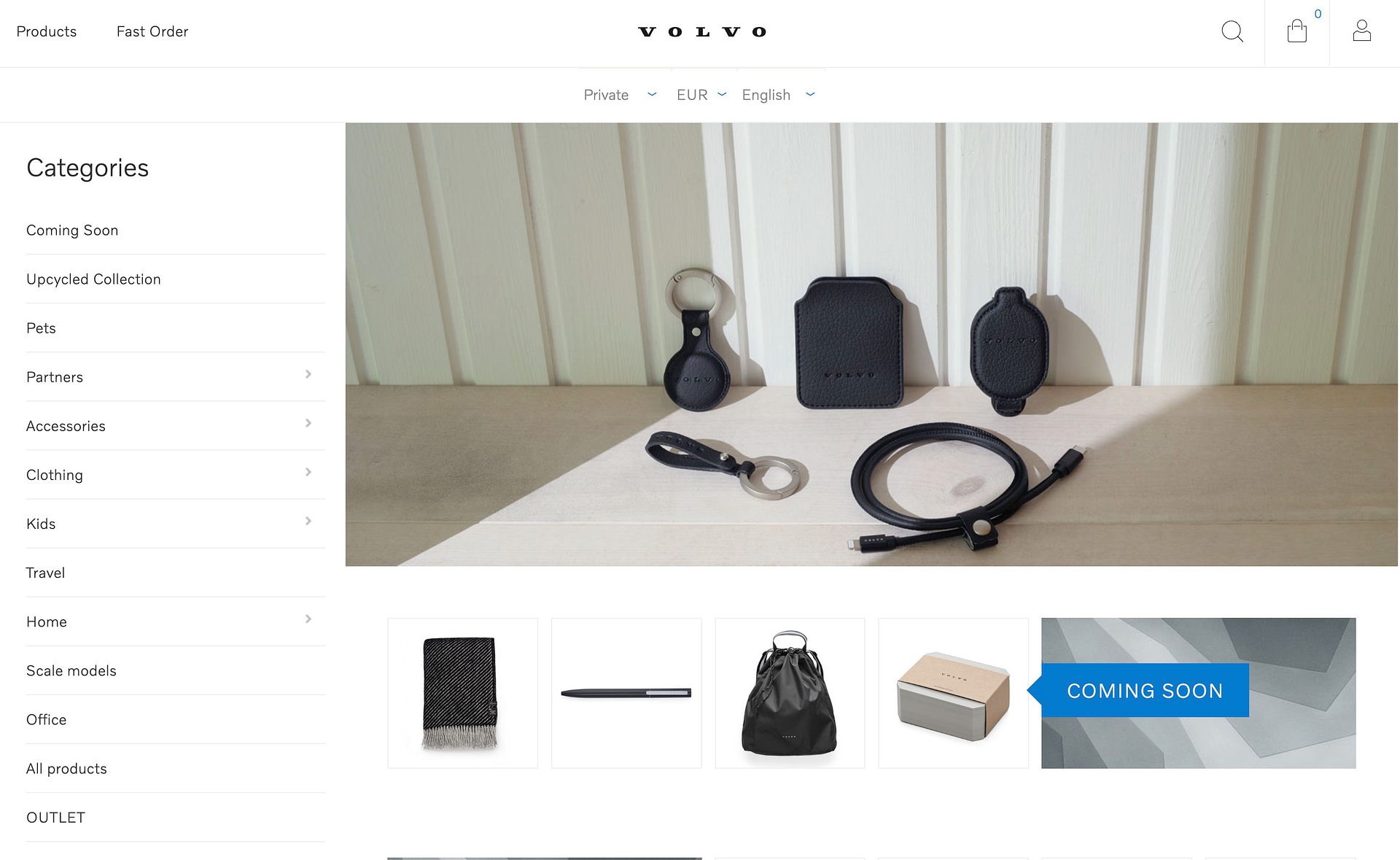
Volvo’s merchandise online store runs on NopCommerce, showcasing their line of branded clothing, accessories, and miniature model cars.
Adobe Commerce – Coca-Cola
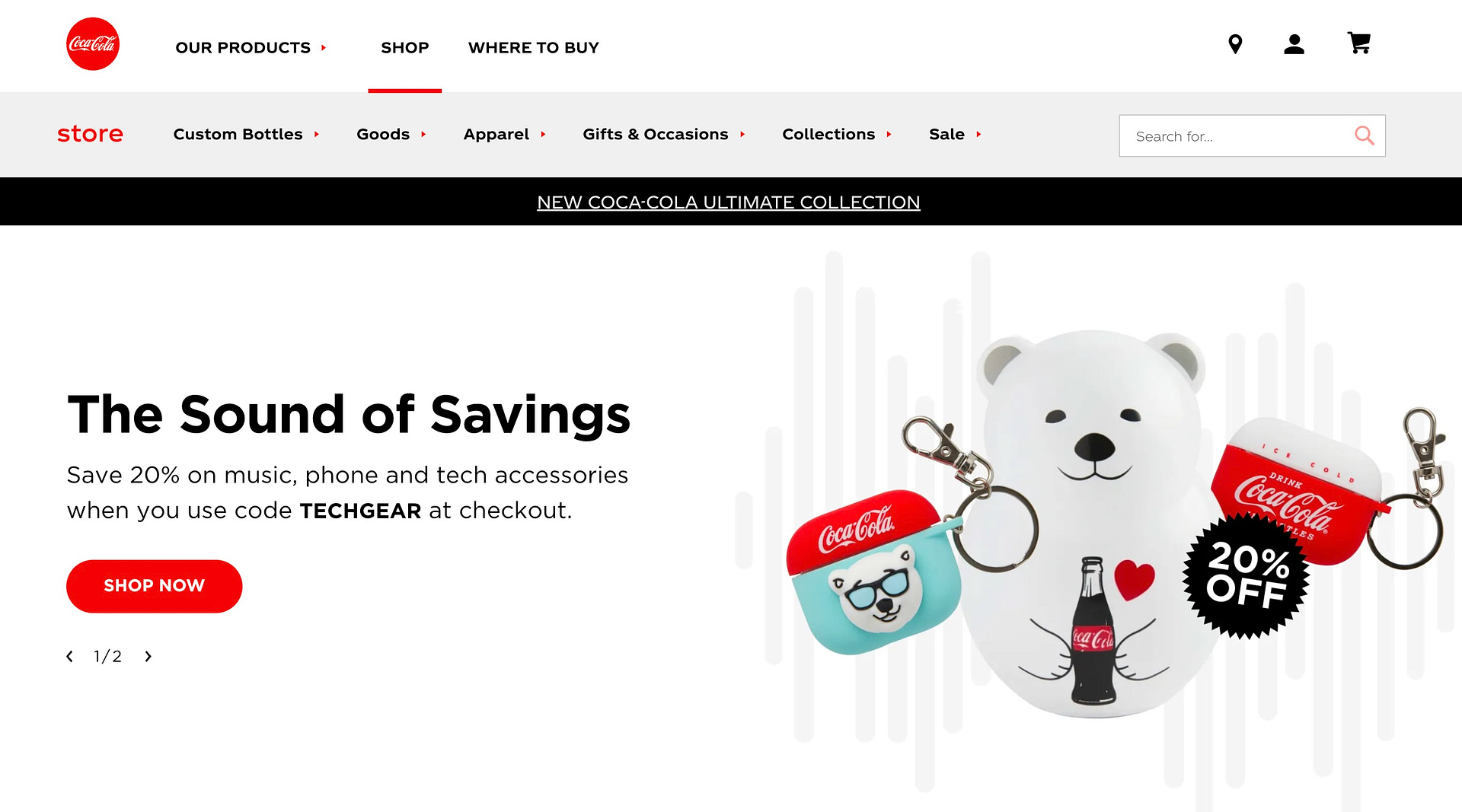
Coca-Cola uses Adobe Commerce for its online store, selling branded merchandise and collectibles.
PrestaShop – Magimix

Magimix, the high profile producer of food processors and blenders, utilizes PrestaShop for ecommerce.
osCommerce – Pearl Jam

Pearl Jam is just one of the many famous artists and ecommerce brands with osCommerce as the backbone of their merchandise sales. Pearl Jam also uses it for selling albums and some tickets.
OroCommerce – SaltWorks
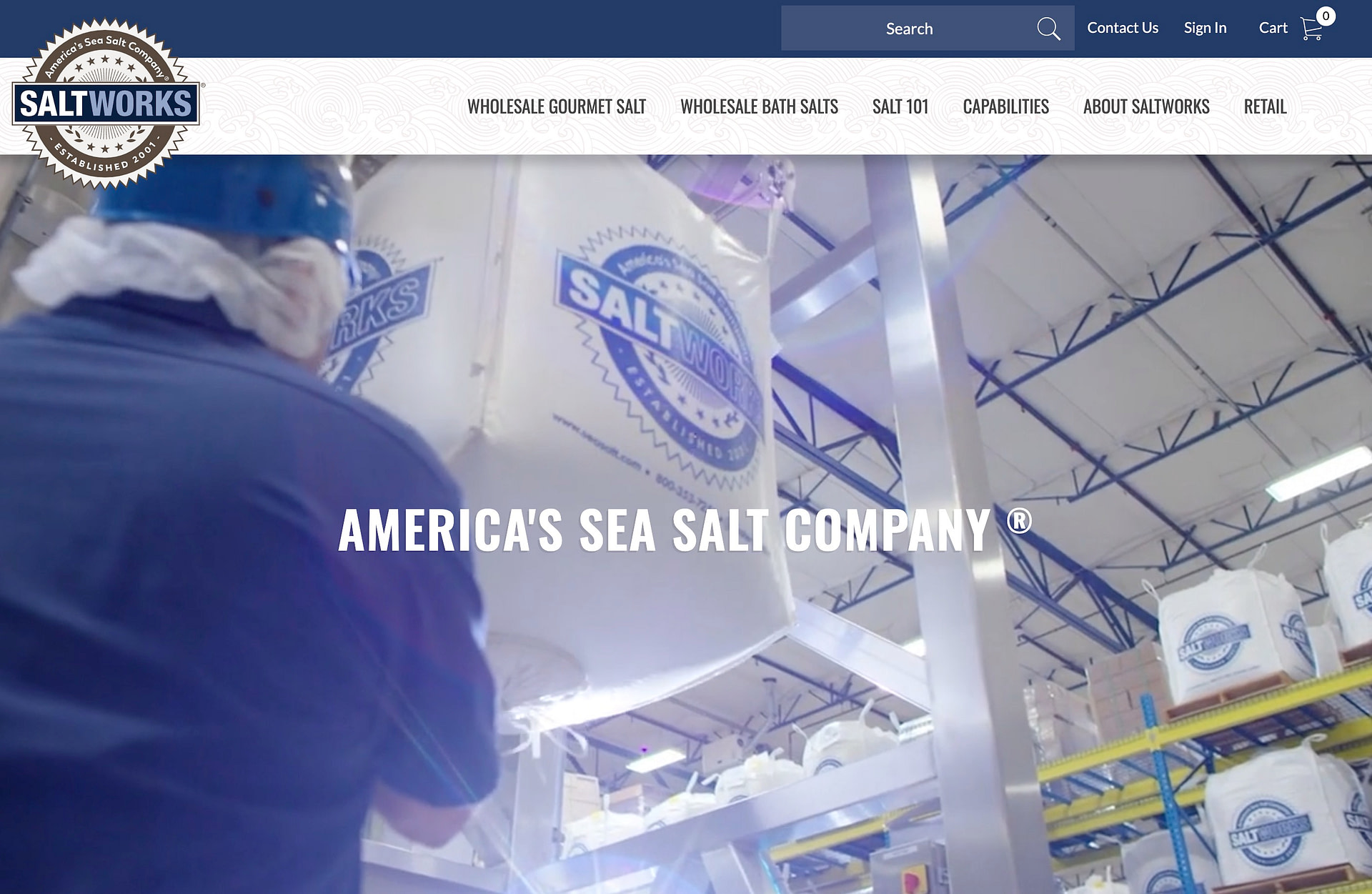
SaltWorks, a gourmet salt company, uses OroCommerce for its B2B ecommerce operations, demonstrating the platform’s ability to handle complex business-to-business transactions.
Our conclusion on the best open source ecommerce platforms 🛒
Open source ecommerce platforms offer businesses extensive customization and control, making them ideal for those with specific requirements or seeking scalability.
🏷️ Brands like SaltWorks, Coca-Cola, and Pearl Jam have successfully adopted these platforms to create unique online shopping experiences, and so can you.
We’d love to hear from you – which ecommerce platform are you leaning towards? Let us know in the comments below!
Free guide
4 Essential Steps to Speed Up
Your WordPress Website
Follow the simple steps in our 4-part mini series
and reduce your loading times by 50-80%. 🚀
[ad_2]


